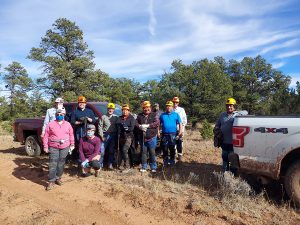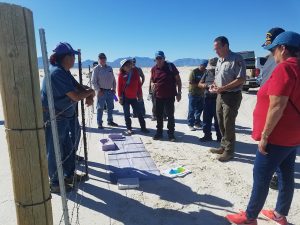
Tribal consultation, repatriation, and compliance with NAGPRA
The Native American Graves Protection and Repatriation Act (NAGPRA) is a landmark human rights law passed in 1990 that transformed how anthropologists, archaeologists, museums, and Native American communities work together. NAGPRA formally affirms tribal sovereignty and establishes a legal framework for tribes to repatriate their ancestors, cultural patrimony, and items with sacred and ceremonial significance. Its passage transformed the practice of archaeology in the field, labs, research institutions, and museums.

Tribal members and MNA staff wear protective gear while visiting a lava cave with traditional cultural significance at El Malpais National Monument. MNA often works with tribes and federal agencies to develop culturally appropriate management practices.
Throughout its history, MNA cultivated valuable working relationships with Colorado Plateau tribes, particularly the Hopi, Zuni, Navajo, Pai, and Apache Bands. MNA curates cultural objects and records originating in tribal communities and on their ancestral lands. These tribal resources are sources of community pride and are available for cultural traditional practitioners and tribal members to study. Because 83 percent of the land in Arizona is managed by state, federal, and tribal agencies, MNA serves as a meeting ground between federal and tribal entities and facilitates consultations and repatriations of human remains and funerary objects.
Repatriation is one way to address the inequities, injustices, and lack of respect for tribal sovereignty that are all part of the colonial legacy of the United States. With the passage of NAGPRA, all museums were required to submit summaries of their holdings to affiliated tribes. Since then, we have seen the return of many cultural items and ancestral remains to sovereign Indigenous nations. MNA submitted summary of holdings lists in 1994 and 1995. Several NAGPRA grants obtained by MNA resulted in updated summaries; on-site consultation with the Hopi, Navajo, Zuni, and Apache Bands to identify objects of tribal importance; and the examination of collections to identify, protect, and report human remains.
Since the passage of updated NAGPRA regulations and protocols in January 2024, MNA has expanded its tribal partnerships as we continue to seek guidance about best practices for caring for and repatriating collections subject to NAGPRA. As part of on-site NAGPRA consultations, the Museum included Native perspectives in the construction of its Easton Collection Center.

MNA facilitating tribal consultations at White Sands National Park.
MNA has worked with tribes and federal agencies to repatriate numerous ancestors, funerary objects, and items of cultural patrimony under NAGPRA, and has voluntarily repatriated Peruvian artifacts to that nation’s government. MNA archaeologists help agencies write comprehensive agreements to facilitate respectful recovery and return when ancestral remains are inadvertently discovered in the course of natural erosion, construction, and other circumstances. Through these processes, we are developing mutually beneficial relationships with tribal museums and cultivating community relationships.
For tribal or federal inquiries regarding consultation, visits, or NAGPRA-related collections, contact our NAGPRA team at MNA_NAGPRAConsult@musnaz.org or 928-774-5211 ext. 282.
Learn more about NAGPRA and repatriation at National NAGPRA and the Association of American Indian Affairs.
